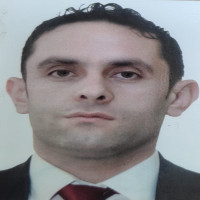Research Article
Issue Reviewers

Sociologist | Ethnographer | Researcher in Cultural Studies & Social Change
Antalya, Turkey | edemir.akdeniz@gmail.com | +90-544-575-49-55.
My doctoral research, titled “An Ethnographic Field Study on Abdals: Culture, Identity and Social Change – The Case of Antalya,” reflects my commitment to exploring marginalized identities and cultural practices through ethnographic methods. Additionally, my master's thesis focused on women’s political participation in Antalya, exemplifying my enduring interest in gender studies and political sociology.
Throughout my academic journey, I have worked on themes such as Roma communities in contemporary Turkey, funeral and ritualistic food practices, and identity formation in the margins of society. I bring with me not only a wealth of ethnographic data and qualitative insight but also a passion for interdisciplinary collaboration.





He received his associate's degree in Classroom Teaching from Ağrı Education College, his bachelor's degree in Education Management and Supervision from İnönü University Faculty of Education, his master's degree from Fırat University Institute of Social Sciences, and his doctorate from İnönü University Institute of Social Sciences. He served for fifteen years as a classroom teacher and primary education inspector at the Ministry of National Education. During this period, he completed his master's and doctoral degrees. He began his academic career in 2005 as an assistant professor in the Department of Educational Sciences at Fırat University Faculty of Education, where he was promoted to associate professor in 2012 and professor in 2019. He is the editor of the journal “Journal of Education and Human Sciences: Theory and Practice.”


Aim & Scope
The Journal of Education Reflections (EYD) aims to publish quality studies in educational sciences, field education and VET systems. Thus contribute to science.
The studies to be submitted for the publication of the Journal of Education Reflections should be from the following disciplines;
• Educational Management
• Curriculum and Instruction
• Eğitim Psychology
• Eğitim Technology
• Eğitim Policies
• Teacher Training Systems
• Psychological Counseling and Guidance
• Foreign Language Education
• Lifelong Learning
• Adult Education
• Field Education
• Measurement and Evaluation etc
Author Guidelines
WRITING RULES
Title
• It should summarize the research topic.
• It should be written in Garamond 14 pt size, bold and justified.
• It should be in both Turkish and English.
• It should not exceed 20 words.
• The initials of each word should be capitalized.
Abstract and Keywords
• It should be in both Turkish and English
• It should be minimum 150, maximum 200 words.
• It should include the purpose, method, a few important results and recommendations of the study clearly and briefly.
• It should be written in Garamond 10 pt size, bold and justified.
• There should be 4 or 5 keywords that reflect the integrity of the study.
Extended Abstract
• It should be at least 750 words (If the research is in Turkish, it should be written in English, and if the research is in English, it should be written in Turkish.), It should not exceed 1200 words.
• It should be written under the titles of Problem Statement, General and Sub-objectives Method, Findings and Discussion and Suggestions.
• Garamond, 11 pt, justified, left and right 2,5 cm indent,
• Paragraphs should start with a 1cm indent.
• No spaces should be left before and after paragraphs.
Main Text
• It should be Garamond 11 pt and margins are 2,5cm.
• It should be written justified.
• Paragraphs should start with a 1cm indent.
• No spaces should be left before and after paragraphs.
• Table and Figure titles should be justified, and the initials of each word should be capitalized.
• There should not be vertical lines on tables and it should not contain any sub-fund attachments observed in the outputs of demo software.
• Figures should be legible and should not contain sub-fund attachments observed in demo software outputs.
General
• The research should be prepared in the titles of Title, Abstract and Keywords, Introduction/Problem Status, Method (Method, Universe and Sample/Study Group, Data collection tools, Data analysis), Findings, Conclusion and Discussion, Suggestions and References.
• References should be prepared in accordance with the principles APA.
• Ethics committee approval information of the research and the support received should be stated in the Method section.
• If the research has multiple authors, the contribution of each author to the study should be explained at the end of the references section.
• If the study is produced from a graduate thesis or project (BAP, Tübitak etc.) and if students, advisors or project group members are not named in the study, the reason should be written, and if possible, a signed document stating that these people voluntarily waived the study should be uploaded to the journal platform along with the study.
• If the study is produced from a graduate thesis or project (BAP, Tübitak, etc.), the necessary information should be specified in the study.
• The Copyright Transfer Agreement for the study should be uploaded to the journal platform simultaneously with the research.
Ethical Principles and Publication Policy
The publication processes implemented in Educational Reflection Journal form the basis for the development and distribution of information in an impartial and respectable manner. The processes implemented in this direction are directly reflected in the quality of the work of the authors and the institutions that support the authors. Peer-reviewed studies are studies that embody and support the scientific method. At this point, it is important that all stakeholders of the process (authors, readers and researchers, publisher, referees and editors) comply with the standards for ethical principles. Within the scope of publishing ethics of Educational Reflection Journal, all stakeholders are expected to bear the following ethical responsibilities.
The ethical duties and responsibilities listed below have been prepared as open access, taking into account the guidelines and policies published by the Committee on Publication Ethics (COPE).
Ethical Responsibilities of Authors
The author(s) who submit a study to Educational Reflection Journal are expected to comply with the following ethical responsibilities:
The works submitted by the author(s) are expected to be original. If the author(s) benefit from or use other works, they are required to cite completely and accurately.
Persons who do not contribute intellectually to the content in the creation of the work should not be specified as the author.
All studies submitted for publication should be disclosed, if any, and their relationships that may constitute a conflict of interest.
Raw data regarding their articles can be requested from the author(s) within the framework of the evaluation processes, in such a case the author(s) should be ready to present the expected data and information to the editorial board and scientific committee.
The author(s) should have a document showing that they have the right to use the data used, the necessary permissions for the research/analysis, or the consent of the experimented subjects.
In the event that the author(s) notices an error in their manuscript they have an obligation to cooperate with the editor in informing, correcting or withdrawing the journal editor or publisher.
Authors cannot submit their work to more than one journal at the same time. To make a new application, the previous one must be completed. A study published in another journal cannot be sent to Educational Reflection Journal. Changing the author responsibilities of a work whose evaluation process has begun (such as adding an author, changing the order of authors, removing an author) cannot be proposed.
Ethical Duties and Responsibilities of Editors
Educational Reflection Journal editors and field editors have the following ethical duties and responsibilities on the basis of the "COPE Code of Conduct and Best Practice Guidelines for Journal Editors" and "COPE Best Practice Guidelines for Journal Editors" published by the Committee on Publication Ethics (COPE) as open access:
General Duties and Responsibilities
Editors are responsible for every publication published in Educational Reflection Journal. In the context of this responsibility, editors have the following roles and responsibilities:
Making efforts to meet the information needs of readers and writers,
Ensuring the continuous development of the journal,
Conducting processes to improve the quality of studies published in the journal,
Supporting freedom of thought,
Ensuring academic integrity,
Continuing business processes without compromising intellectual property rights and ethical standards,
To show openness and transparency in terms of publication on issues that require correction and explanation.
Communication with the Reader
Editors should make decisions by considering the knowledge, skills and experience expectations of all readers, researchers and practitioners. The editor should pay attention to the fact that the published studies contribute to the reader, researcher, practitioner and scientific literature, and that they are original. In addition, editors are obliged to consider the feedback from readers, researchers and practitioners, and to provide explanatory and informative feedback.
Communication with Authors
The duties and responsibilities of the editors to the authors are as follows:
Editors should make a positive or negative decision based on the importance, original value, validity, clarity of the narrative, and the journal's goals and objectives.
Studies that are suitable for the scope of publication should be taken to the preliminary evaluation stage unless they have serious problems.
Editors should not ignore positive referee suggestions unless there is a serious problem with the study.
New editors should not change the decisions made by the previous editor(s) regarding the studies unless there is a serious problem.
Blind refereeing and the Evaluation Process must be published and the editors must prevent deviations that may occur in the defined processes.
Editors should publish an Author's Guide that includes every detail expected from them by the authors in detail. These guides should be updated periodically.
Authors should be informed and returned in an explanatory and informative way.
Communication with Referees
The duties and responsibilities of the editors towards the referees are as follows:
The editor should determine the referees in accordance with the subject of the study.
The editor is responsible for providing the information and guides that the referees will need during the evaluation phase.
The editor has to consider whether there is a conflict of interest between the authors and the referees.
Editorial Blinding should keep the identity of the referees confidential in the context of refereeing.
The editor should encourage the Reviewers to evaluate the work in an impartial, scientific and objective language.
The editor should evaluate the referees with criteria such as timely return and performance.
The editor should determine practices and policies that increase the performance of the Referees.
The editor should take the necessary steps to dynamically update the Reviewer pool.
The editor should prevent rude and unscientific reviews.
The editor should take steps to ensure that the Reviewer pool is broad.
Communication with the Editorial Board
Editors should ensure that all editorial board members follow the processes in accordance with editorial policies and guidelines. The editorial board should inform its members about the publication policies and keep them informed of the developments. The editor should inform the new editorial board members on editorial policies and provide the information they need.
In addition, editors;
The editor should ensure that the members of the editorial board evaluate the work impartially and independently.
The editor should appoint new editorial board members who can contribute and are suitable
The editor should send the studies suitable for the specialization of the members of the Editorial Board for evaluation.
The editor should interact with the Editorial Board regularly.
The editor should hold meetings with the Editorial Board at regular intervals for the development of editorial policies and the journal.
Communication with Journal Owner and Publisher
The relationship between the editors and the publisher is based on the principle of editorial independence. In accordance with the written contract between the editors and the publisher, all decisions taken by the editors are independent of the publisher and the journal owner.
Editorial and Blind Review Processes
The editor is responsible for applying the Blind Refereeing and Evaluation Process policies included in the journal's publication policies. In this context, the editor ensures that the fair, impartial and timely evaluation process of each work is completed.
Quality assurance
Editor; is responsible for publishing every article published in the journal in accordance with journal publication policies and international standards.
Protection of Personal Data
The editor is obliged to ensure the protection of personal data regarding the subjects or images included in the evaluated studies. The Editor is responsible for rejecting the study unless the explicit consent of the individuals used in the studies is documented. In addition, editors are responsible for protecting the individual data of authors, referees and readers.
Ethics committee, Human and Animal Rights
The editor is responsible for ensuring the protection of human and animal rights in the evaluated studies. The Editor is responsible for rejecting the study in the absence of ethics committee approval for the subjects used in the studies and permissions for experimental studies.
Precaution against possible abuse and misconduct
The editor is obliged to take precautions against possible abuse and misconduct. It is among the responsibilities of the editor to share the relevant findings, as well as to conduct a meticulous and objective investigation regarding the identification and evaluation of complaints regarding this situation.
Ensuring academic publication integrity
The editor should ensure that the judgments containing errors, inconsistencies or misdirection in the studies are promptly corrected.
Protection of Intellectual Property Rights
The editor is obliged to protect the intellectual property rights of all published articles and to defend the rights of the journal and the author(s) in case of possible violations. In addition, the editors are obliged to take the necessary measures so that the contents of all published articles do not violate the intellectual property rights of other publications.
Openness to Discussion
The editor should take into account the persuasive criticisms of the works published in the Journal and should adopt a constructive attitude towards these criticisms.
The editor should give the right to reply to the author(s) of the critiqued studies.
The editor should not ignore or exclude studies with negative results.
Complaints
The editor is obliged to carefully examine the complaints from the author, referee or readers and respond in an enlightening and explanatory manner.
Political and Commercial Concerns
The journal owner, publisher and no other political or commercial factors affect the editors' independent decision making.
Conflicts of Interest
The editor ensures that the publication process of the studies is completed independently and impartially, taking into account the conflicts of interest between the author(s), referees and other editors.
Ethical Responsibilities of Reviewers
Evaluation of all studies by blind review directly affects the quality of publication. This process provides confidence through an objective and independent evaluation of the publication. Educational Reflection Journal's evaluation process is carried out with the principle of double-blind review. Referees cannot directly communicate with authors, evaluations and comments are transmitted through the journal management system. In this process, reviewer comments on evaluation forms and full texts are forwarded to the author(s) through the editor. In this context, it is expected that the referees evaluating the work for Educational Reflection Journal have the following ethical responsibilities:
Reviewers should only accept work related to their area of expertise to be evaluated.
Reviewers should evaluate with impartiality and confidentiality.
If the reviewers think that they are facing a conflict of interest during the Evaluation process, they should refuse to review the study and inform the journal editor.
Reviewers should only accept work related to their area of expertise to be evaluated.
Reviewers should evaluate with impartiality and confidentiality.
If the reviewers think that they are facing a conflict of interest during the Evaluation process, they should refuse to review the study and inform the journal editor.
Reviewers should make the Evaluation objectively only in relation to the content of the study. Nationality, gender, religious beliefs, political beliefs and commercial concerns should not influence the evaluation.
Reviewers must do the Evaluation in a constructive and courteous language. Do not make derogatory personal comments that include hostility, slander and insults.
Reviewers must perform the work they accept to evaluate on time and with the above ethical responsibilities.
The editors are responsible for all processes of the studies submitted to Educational Reflection Journal. In this context, the decision makers are the editors, regardless of economic or political gains.
It undertakes to create an independent editorial decision.
It protects the property and copyright of every article published in Educational Reflection Journal and undertakes to keep a record of every published copy.
It has the responsibility to take precautions against all kinds of scientific abuse, citation fraud and plagiarism regarding the editors.
If You Encounter an Unethical Situation
If you encounter any unethical behaviour or content in Educational Reflection Journal, apart from the ethical responsibilities mentioned above, please report it to mtuncer@firat.edu.tr via e-mail.
Price Policy
Educational Reflection Journal does not charge authors any fee for submitting and publishing their manuscripts.






